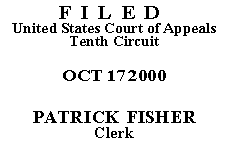

| JOSE L. PAREDES,
Petitioner-Appellant, v. GENE ATHERTON; ATTORNEY GENERAL OF THE STATE OF COLORADO, Respondents-Appellees. |
|
Jose L. Paredes, a state inmate appearing pro se and in forma pauperis, seeks to appeal the district court's dismissal of his habeas corpus action. We exercise jurisdiction pursuant to 28 U.S.C. § 1291 and dismiss the appeal.
Paredes filed a petition for writ of habeas corpus pursuant to 28 U.S.C. § 2254 challenging his convictions for menacing with a deadly weapon, first-degree criminal trespass, and attempted second-degree assault. The district court dismissed the petition without prejudice due to Paredes' failure to exhaust state court remedies. On August 28, 2000, this court granted a certificate of appealability under 28 U.S.C. § 2253(c), limited to the procedural issue of whether the requirement of exhaustion of state remedies should be waived in this case, and directed briefing on that issue. See Paredes v. Atherton, No. 00-1016, 2000 WL 1289022 (10th Cir. Aug. 28, 2000).
Based on the parties' responses, we conclude that this case presents no unusual circumstances which excused Paredes from pursuing his state remedies. See O'Sullivan v. Boerckel, 526 U.S. 838, 842 (1999) (requiring a state prisoner to "give the state courts an opportunity to act on his claims before he presents those claims to a federal court in a habeas petition"); Duckworth v. Serrano, 454 U.S. 1, 3 (1981) (per curiam) (stating that "[a]n exception is made only if there is no opportunity to obtain redress in state court or if the corrective process is so clearly deficient as to render futile any effort to obtain relief.").
We therefore dismiss the appeal. Paredes' renewed motion for appointment of counsel is denied; his motion for substitution of parties is denied as moot. Paredes' motion for leave to proceed in forma pauperis is granted. The mandate shall issue forthwith.
Entered for the Court
Circuit Judge
*. This order and judgment is not binding precedent, except under the doctrines of law of the case, res judicata, and collateral estoppel. The court generally disfavors the citation of orders and judgments; nevertheless, an order and judgment may be cited under the terms and conditions of 10th Cir. R. 36.3.